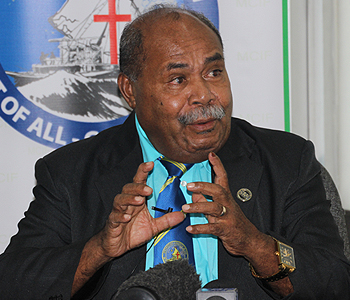
The Methodist Church of Fiji said it will remain apolitical but it strongly opposes Fiji being a secular state.
This follows the newsletter that was disseminated by the Secretary of the Christian Citizenship and Social Services of the Methodist Church of Fiji, Reverend Iliesa Naivalu to church ministers.
Secretary of Communications Reverend James Bhagwan clarified that they oppose a secular state because it is part of their conference resolution last month.
Some concerned members of the Methodist Church raised the issue with us after the letter was read out from the pulpit by some church ministers on the Sunday before the elections.
In the letter, Reverend Naivalu said that voters should not be swayed by the developments carried out.
Reverend Naivalu also said that the church strongly opposed the secular state status.
The letter also said that the church would support a government that supports multi-racialism and according to Reverend Naivalu this could be achieved by looking at the 1997 constitution and the Ghai Draft Constitution because they both represent the voice of the people.
The letter said that the church strongly opposes the state's neutral prayer.
Reverend Naivalu also raised concern about what he claims as a weakening of the i-Taukei Affairs, the removal of the Great Council of Chiefs, the change in the leadership and representatives to the board of the i-Taukei Affairs Board and the scholarship criteria.
Some members of the Methodist Church who have contacted us say that the church should always remain neutral as supporters of different parties are members of the church.
They said certain church ministers should not push their own personal agenda and promote the policies of a particular party during an election campaign.
Methodist Church General Secretary Reverend Tevita Nawadra confirmed that the newsletter was read out without the knowledge of the church executives.
Speaking at a press conference this afternoon, Reverend Nawadra said the efforts made by Reverend Naivalu was well intended.
He said it has been brought to their attention that there is a loop hole in their process of communication, therefore, they will review their communications hierarchy to avoid a repeat of such incidents.
When questioned if Reverend Naivalu will be taken to task, Reverend Nawadra said they only wish to right the wrong.
The 2013 constitution states that religious belief is personal, religion and the State are separate, which means that the State and all persons holding public office must treat all religions equally; the State and all persons holding public office must not dictate any religious belief; the State and all persons holding public office must not prefer or advance, by any means, any particular religion, religious denomination, religious belief, or religious practice over another, or over any non-religious belief.
The constitution also states that every person has the right to freedom of religion, conscience and belief.
It also said that every person has the right, either individually or in community with others, in private or in public, to manifest and practice their religion or belief in worship, observance, practice or teaching.
Stay tuned for the latest news on our radio stations
